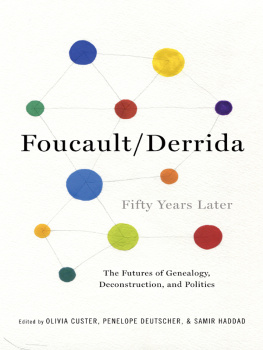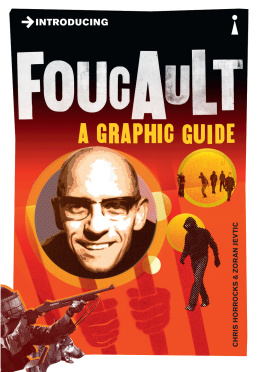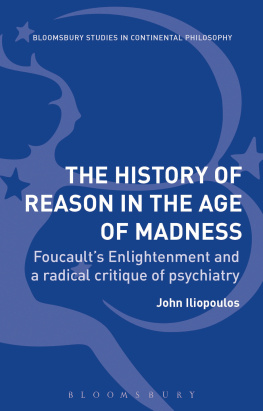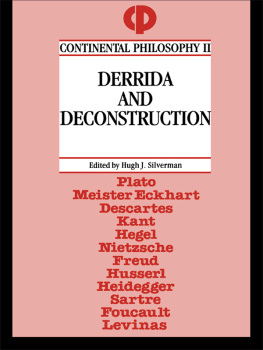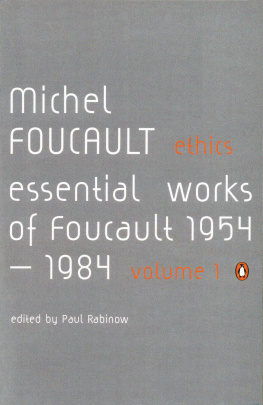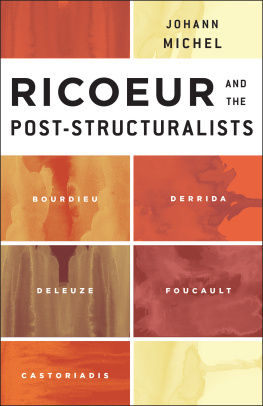Foucault and Derrida
THE OTHER SIDE OF REASON
Roy Boyne

London and New York
First published 1990
by Unwin Hyman Ltd
Reprinted 2001
by Routledge
11 New Fetter Lane, London EC4P 4EE
29 West 35th Street, New York, NY 10001
Routledge is an imprint of the Taylor & Francis Group
1990 Roy Boyne
All rights reserved. No part of this book may be reprinted or reproduced or utilized in any form or by any electronic, mechanical, or other means, now known or hereafter invented, including photocopying and recording, or in any information storage or retrieval system, without permission in writing from the publishers.
British Library Cataloguing in Publication Data
A catalogue reference for this book is available from the British Library.
Library of Congress Cataloguing in Publication Data
A catalogue reference for this book is available from the Library of Congress.
ISBN 0-415-11916-2
ISBN 978-1-136-16102-5 (ePub)
Transferred to digital reprinting 2001
Printed in Great Britain by Antony Rowe Ltd, Eastbourne
The Cure of Madness by Hieronymus Bosch (Prado, Madrid)
The Ship of Fools by Hieronymus Bosch (The Louvre, Paris)
The Temptation of St Anthony (detail) by Hieronymus Bosch (Museu Nacional de Arte Antiga, Lisbon)
The Triumph of Death by Peter Brueghel (Prado, Madrid)
Dulle Griet by Peter Brueghel (Musee Mayer van den Bergh, Antwerp)
Horsemen of the Apocalypse by Albrecht Durer (British Museum, London)
Caprichos No. 43 by Goya (British Museum, London)
The Witches Sabbath by Goya (Prado, Madrid)
I would like to thank Zygmunt Bauman and Janet Wolff, who both supported this work from the beginning. Rosalind Boyne gave much support in its early stages. The SSRC, as it was then, provided funding for a period of study in France. My colleagues at Newcastle Polytechnic covered teaching for me, so that I could concentrate on the book at a crucial stage. Library staff at the Polytechnic, especially Philip Judd, were unfailingly helpful. John ONeill, Bryan Turner, Scott Lash, Richard Kilminster and Richard Roberts all read parts of the manuscript and offered helpful support and criticism. Most of all, however, I am grateful to Nicky Turnbull. She has caused me to question some of my deepest prejudices. I have learnt much from her, and continue to do so.
In many ways this book is a kind of detective story. It tries to find something out about the kind of society which is taking shape in these last years of the century. No doubt the empirical sociologist will be aghast to find that, instead of an examination of structural social change in, for example, Europe and North America, the solid core of the investigation concerns the nature of madness, the birth of the prison, problems of textual interpretation, the nature of the self in ancient Greece, and forms of theorizing current within socialist, feminist and anti-racialist movements. But forensic procedures are not always obvious, and in this case they lead to certain hypotheses about our present and future which perhaps could not have been easily arrived at in any other way.
The story begins with an academic debate. In 1961 a young French philosopher named Michel Foucault published a lengthy treatise on the history of madness. This original and controversial work has since been criticized for its inaccuracies, its parochialism, its neglect of long tracts of historical time, its romanticism and the tortuousness of its gnomic pronouncements. But only one critical response really hit the mark. It came two years after the books initial publication, in the form of a spoken presentation given by Jacques Derrida a philosopher of literature who was to become famous as the founder of deconstruction, which is a rigorous and contentious kind of textual criticism.
Superficially the debate, at times acrimonious, between Foucault and Derrida was not about madness at all, but about the patriarch of Western philosophy, Ren Descartes. However, to an extent perhaps underappreciated by the participants themselves, the real object of their dispute was the nature of Western thought: is it possible to imagine a complete restructuring of the way we think?
Both of these philosophers had powerful reasons, as we shall see, for holding to their respective positions. But, away from the heat and light of their direct confrontation, and long after the discussion appeared to be over, the two protagonists proceeded along paths which would eventually cross. The point at which they finally do so is the common ground of power and ethics.
As far as power is concerned, it might be thought that such a development is hardly surprising. After all, the concept of power is central to most of the frameworks which are applied, in the pursuit of rigorous understanding, to social phenomena. So even though they developed interests in different things after their public disagreement, the mere fact that they both came to appreciate the importance of power for the things they studied should not of itself be of any particular importance. In the normal course of events that would be so. But in this case, the understanding of power in Derridas work is only implicit, while, in Foucaults work, it is quite explicit. Nothing arises out of this until two things are realized: first, that Foucaults understanding of power seeks to break with all the traditional forms of understanding social relations; and second, that the concept of power that is only implicit in Derridas work is made explicit by Foucault, for whom in doing so hardly a thought of Derrida crosses his mind.
When we consider the question of ethics, and let us be quite specific, of Kantian ethics, what seems further remarkable is that both Foucault and Derrida arrive, at the end of their trajectories, at an affirmation of one law above all others. That law is effectively the categorical imperative that human beings should never be treated as means alone, that the foundation of right behaviour is to be sought in the idea of the universalizability of the principles according to which one acts. That such ideas should appear to be their joint destination is especially noteworthy given not only their animosity to one another, but also their shared scepticism and hostility to the main lines of Western philosophy. It is as if both thinkers were separately engaged, from their different points of view, in the same test of reason, at the end of which they found certain elements therein that could not be denied.
We have, then, a remarkable turn around. Two philosophical opponents leave their field of combat in a state of fundamental disagreement. They develop their work in different directions yet nevertheless meet up again in an unrecognized partnership of theoretical understanding.
This book seeks to chart the unconscious history of this partnership. The first chapter, while not aspiring to provide an exhaustive account of Foucaults first major work, will introduce his history of madness. In the second chapter, we will examine the idea that Descartes thought is entirely complicit with the exclusion of madness from the developing civilization of the West. Derrida enters the scene in Chapter 3, which provides an extended account of his philosophical dispute with Foucault. Chapter 4 takes us beyond their direct confrontation and shows, through a comparison of Foucaults work on the history of the prison and some of the main texts of deconstruction, how their underlying assumptions began to converge. The fifth and final chapter witnesses their arrival at the intersection of politics and ethics.





